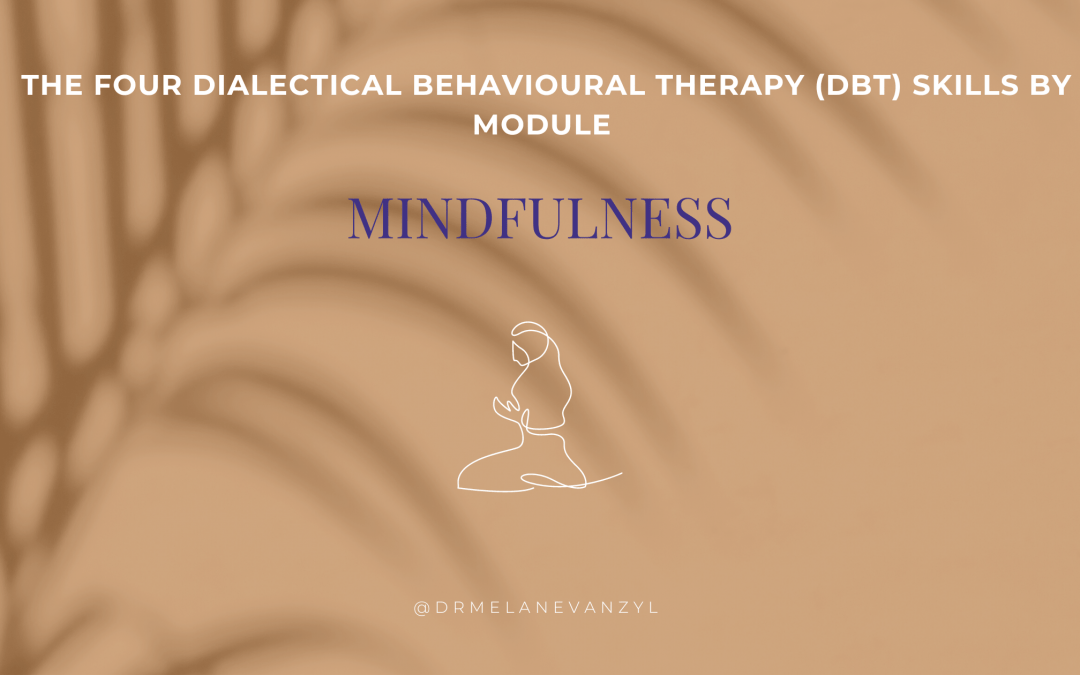In the last articles we have looked at what DBT is. DBT is a skills based, behavioural therapy used for a variety of psychological problems. However, these skills are incredibly valuable for all of us. When signing up to participate in this program there will be certain requirements, e.g. the patient should also be in individual therapy. However, these skills are SO effective (and so cool to have them available in any stressful situation), that I will sell the idea to try them out to anyone who has ever felt he/she is not in control of his emotions or actions (is this not all of us?) In the standard adult program the skills are being taught and practiced over 24 weeks. We will have a closer look at what happens during those 24 weeks. In this article we look specifically at Mindfulness.
The total amount of weeks is divided by the four modules. Usually there is a ‘block’ of Mindfulness between each module. Some programs let new participants join in every Mindfulness block.
- Mindfulness
Mindfulness skills are central to DBT. Mindfulness is a practice of entering the present moment without reserve or judgement, entering into existence (simply ‘being’) with awareness that life is a process of constant change. In my previous article Why mindfulness is so helpful for BPD I have looked at some reasons why mindfulness is important.
Mindfulness has to do with the quality of awareness we bring to everyday life. Mindfulness comes from the East, especially Zen practices, but solid evidence is ever emerging that being mindful is a valuable skill. It is so much more effective to allow current experiences, even is they are unpleasant, than to try to avoid, supress or change them. Being mindful is simple and easy, and at the same time it is a practice that can take many years to master.
Mindfulness is at the core of all the major religions of the world, but it can of course be practised in a secular way. So do not worry that practising mindfulness will interfere with your religious beliefs. We do not spend a lot of time meditating in DBT, it is more a way of living mindfully, being fully aware of the present moment without judgement. The DBT mindfulness skills are simple, and focus (pardon the pun) on focussing the mind by easy exercises such as counting the breath.
The following are the core mindfulness skills that are taught when participating in a DBT program:
- States of Mind and the “Wise mind” Skill
In DBT there are three states of mind: reasonable mind, emotional mind and wise mind. We make decisions based on logic and facts when we are in reasonable mind, but when we are in emotional mind our decisions are ruled by our emotions. However, emotional mind is also valuable because it gives us compassion and kindness. Thus, we aim to be acting from a place of wise mind, which is where the emotional mind and the reasonable mind overlap.
- Three Mindfulness “What” skills:
- Observing
Observing means just watching what is happening, without trying to change it or to step away from it.
- Describing
It is a skill to learn how to describe the facts of what we are experiencing in the moment, and not to interpret it. For example, we can say we feel our stomach muscles tightening rather than something like “I am going to fail the exam”
- Participating
This means to ‘live in the now’ without feeling self-consciousness.
- Three Mindfulness “How” skills
The other three mindfulness skill are how one observes, describes, and participates:
- Nonjudgmentally
To be non-judgmental means to take whatever has been observed and to see it not as good or bad, but just that it ‘is’. This does not mean that everything is ok, from a DBT perspective it means that behaviour can be improved, but it is not labelled as ‘bad’.
- One-Mindfully
This means to focus all your attention to one thing, not to be distracted by thoughts about the past or worries about the future. Only focus on what is happening right now.
- Effectively
We try to be effective, rather than to decide what is right and what is wrong. It is more important to do what works than trying to be right.
Mindfulness is a broad topic, but having a look at these DBT skills gives a better understanding of how we can practice mindfulness. We will look at the other three Modules in the next articles.

